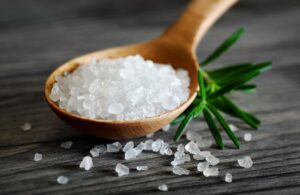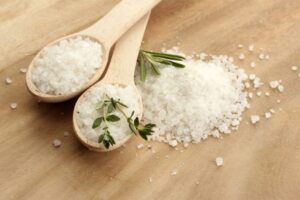
In January-June 2024, Ukraine imported 211,692 thousand tons of salt, which is 45.88% less than in the same period a year earlier, when external purchases amounted to 391,186 thousand tons.
According to statistics released by the State Customs Service (SRS), spending on salt purchases on foreign markets in the first half of 2025 decreased by 48.46% to $26.919 million, compared to $52.225 million in the same period of 2024.
The main suppliers of salt to Ukraine in January-June were Egypt, which accounted for 46.09% of supplies, worth $12.407 million, Turkey (17.57% and $4.730 million) and Romania (13.41% and $3.611 million)..
A year earlier, the top three salt suppliers were the same: Egypt (54.89% or $28.668 million), Turkey (17.15% or $8.956 million) and Romania (14.69% or $7.671 million).
As reported, Ukraine exported 710,040 tons of salt worth $28.32 million in pre-war 2021, while in 2022, exports fell fivefold in real terms to 142,038 tons, and revenues fell even more sharply to $3.82 million. The main buyers of Ukrainian salt in 2021 were Poland (39.1%), Hungary (27.4%), and Romania (7.3%). In 2021, Ukraine imported 142,810 tons of salt worth $12.92 million.
After the occupation by Russian troops in April 2022 of the country’s largest salt producer, Artemsol, Ukraine virtually stopped its exports and became a net importer.
The Tereblya salt deposit (Zakarpattia region) resumed salt production in August 2023. The head of the Zakarpattia Regional State Administration, Viktor Mykyta, said that Zakarpattia would be able to provide Ukraine with 100% of its technical and table salt.
The Dolinsky deposit (Ivano-Frankivsk region) plans to resume salt production in the near future. Work is currently underway on the Dolinsky deposit development project, and a thorough environmental impact assessment is being conducted. Specialists from the State Scientific Research and Design Institute of Basic Chemistry “Niochim” are preparing a design solution for a future salt production plant. A special permit for the extraction of rock salt (halite) in 2023 was obtained by the Kharkiv-based company “Planeta Komfort.”

In January-September 2024, Ukraine imported 526.545 thousand tons of salt worth $69.844 million, which is 65.6% and 6.64% more than in the same period last year, respectively. According to statistics released by the State Customs Service (SCS), Egypt became the largest supplier of salt to Ukraine, accounting for 55.41% of total imports worth $38.7 million in January-September 2024.
Turkey and Romania accounted for 15.7% and 15.6% of supplies, for which these countries earned $10.96 million and $10.81 million, respectively.
A year earlier, Ukraine’s top three salt importers were Turkey with a 30.9% share, Egypt and Romania with 21.6% and 20.9%, respectively. Their revenues from salt sales amounted to $20.3 million, $14.11 million and $13.697 million, respectively.
In January-September 2024, Ukraine reduced its salt exports to a record low of 21 tons, for which it earned $21 thousand. Its buyers were Romania, which purchased 17 tons (80.9%), Moldova and Spain purchased 1 ton each, which amounted to 4.8% for each country.
A year earlier, salt exports amounted to 38 tons, for which Ukraine earned $155 thousand. The exports of this product, which decreased, were supported by Romania, which bought 35 tons (94.6%), and Moldova with 1 ton (2.7%).
As reported, in pre-war 2021, Ukraine exported 710.04 thousand tons of salt for $28.32 million, while in 2022 it fell fivefold in physical terms to 142.038 thousand tons, and revenue fell even more, to $3.82 million. In 2021, the main buyers of Ukrainian salt were Poland (39.1%), Hungary (27.4%), and Romania (7.3%). In 2021, Ukraine imported 142.81 thousand tons of salt worth $12.92 million.
After the occupation of the country’s largest salt producer, Artemsol, by Russian troops, Ukrainian salt exports amounted to only 149 tons for $32 thousand in the first half of 2023.

In January-September 2024, Ukraine imported 526.545 thousand tons of salt worth $69.844 million, which is 65.6% and 6.64% more than in the same period last year, respectively.
According to statistics released by the State Customs Service (SCS), Egypt became the largest supplier of salt to Ukraine, accounting for 55.41% of total imports worth $38.7 million in January-September 2024.
Turkey and Romania accounted for 15.7% and 15.6% of supplies, for which these countries earned $10.96 million and $10.81 million, respectively.
A year earlier, Ukraine’s top three salt importers were Turkey with a 30.9% share, Egypt and Romania with 21.6% and 20.9%, respectively. Their revenues from salt sales amounted to $20.3 million, $14.11 million and $13.697 million, respectively.
In January-September 2024, Ukraine reduced its salt exports to a record low of 21 tons, for which it earned $21 thousand. Its buyers were Romania, which purchased 17 tons (80.9%), Moldova and Spain purchased a ton each, which was 4.8% for each country.
A year earlier, salt exports amounted to 38 tons, for which Ukraine earned $155 thousand. Exports of this product were supported by Romania, which bought 35 tons (94.6%), and Moldova – a ton (2.7%).
As reported, in pre-war 2021, Ukraine exported 710.04 thousand tons of salt for $28.32 million, while in 2022 it fell fivefold in physical terms to 142.038 thousand tons, and revenue fell even more, to $3.82 million. In 2021, the main buyers of Ukrainian salt were Poland (39.1%), Hungary (27.4%), and Romania (7.3%). In 2021, Ukraine imported 142.81 thousand tons of salt worth $12.92 million.
After the occupation of the country’s largest salt producer, Artemsol, by Russian troops, Ukrainian salt exports amounted to only 149 tons for $32 thousand in the first half of 2023.

The Government of Ukraine has maintained zero quotas for the export of natural gas of Ukrainian origin, edible salt, anthracite, coal and coal briquettes, gold, silver, as well as precious metal waste and scrap for 2024.
The Cabinet of Ministers published Resolution No. 1402 of December 27 on the list of goods subject to licensing on its website.
According to the resolution, the quotas for the export of liquid fuel (fuel oil), which were in effect in 2023, were preserved – 540 thousand tons (no more than 60 thousand tons per month) and coking coal – 900 thousand tons.
In addition, the government has extended the ban on the export of fuel wood, wood chips or shavings for January-February 2023, after which the export of these goods will be removed from the list of licensed goods.
The licensing of wheat, rye, barley, oats, corn, soybeans, rapeseed and sunflower seeds, soybean, rapeseed, sunflower and mustard oil, and oilcake has also been retained.
ANTHRACITE, BAN, EXPORT, GAS, SALT

The share of imported salt in the Ukrainian market in January-June 2023 reached 15%, 211.737 thousand tons were purchased on foreign markets for $46.196 million.
According to statistics released by the State Customs Service (SCS), the largest supplier of salt to Ukraine remains Turkey, which provided 32.4% of all salt imports in the first half of 2023 and earned $14.966 million.
Egypt and Romania accounted for 23.3% and 17.7% of shipments, for which these countries earned $10.745 million and $8.174 million, respectively.
A year earlier, the top three importers of Ukrainian salt were Turkey with a market share of 29.8% of supplies, Poland and Romania with 22.8% and 19.8% respectively. Their revenue from its sale amounted to $7.492 million, $5.722 million and $4.969 million, respectively.
The State Customs Service recalls that in 2022, the share of imported salt in the domestic market totaled 15%. On foreign markets Ukraine purchased 438.105 thousand tons of salt for the amount of $92.116 million.
In 2021, the level of imported salt in Ukraine did not exceed 2%, which amounted to 142.813 thousand tons at $12.920 million.
For export in this pre-war year, Ukrainian enterprises supplied 710.041 thousand tons of salt, from the sale of which they received $28.323 million.
In 2022, Ukraine reduced salt exports by 80% to 142.038 thousand tons compared to 2021, with revenues of $3.821mn.
The main buyers of Ukrainian salt in 2021 and 2022 were Poland (import share of 39.1% and 44.4%, respectively), Hungary (27.4% and 27.3%) and Romania (7.3% and 5.1%).
In the first half of 2023, exports of Ukrainian salt amounted to only 149 tons at $32 thousand. It was bought by Romania (93.5% of supplies) and Moldova (3.2%).
Earlier, the analytical “Club of Experts” analyzed the situation with export and import of salt in Ukraine, for more details see the link

Kation Invest LLC (village of Tereblya, Transcarpathian region) has begun the development of the Bushty salt deposit on the territory of the Bushty community of the Tyachevsky district of the Transcarpathian region, which will fully meet the needs of Ukraine in technical salt, the head of the Transcarpathian Regional Military Administration (OVA) said. Viktor Mikita on Facebook.
He specified that the company expects to produce the first batches of salt within six months. In total, the field allows to produce up to 150 thousand tons per month by underground extraction through boreholes located on the surface of the earth.
“Unfortunately, due to the hostilities in the Donetsk region, the Artemsol state enterprise, which provided 100% of the country’s needs, stopped. To fulfill certain tasks to cover the country’s food security, Transcarpathia was involved in this difficult, but extremely important work. After preliminary geological research, a colossal salt layer starting from 35m to 500m,” he said.
According to Mikita, Cation Invest has already begun engineering work on the construction of an access road, marking drilling sites, equipped housing for workers, and also purchased modern equipment for deep industrial drilling.
“According to experts, in six months we will have the first mined salt. The deposit will be able to meet 100% of Ukraine’s demand for technical salt supplied to hold roads in the winter. Now the country’s need for technical salt is up to 450,000 tons per season” , – the head of the OVA emphasized.
In addition, it is planned to develop the infrastructure of the enterprise for the production of table salt for the needs of the population.
“We provided the investor with the most favorable conditions, agreed to consider additional options within the industrial park, allowing the enterprise to develop faster,” Mikita summed up.
According to the Unified State Register of Legal Entities and Individual Entrepreneurs, Kation Invest LLC with an authorized capital of UAH 4.3 million was established in 2014, 95% of its shares belong to Valentin Kondratiev and 5% to Igor Gerey.
As reported, the state-owned enterprise Artyomsol (Soledar, Donetsk region), previously the largest salt producer in Europe, stopped work in April indefinitely due to the invasion of Ukraine by Russian troops. The production process at the enterprise is impossible due to the shelling of Soledar by the Russians, damage to its salt mines and infrastructure.
As a result, Ukraine was forced to buy salt from Poland, Romania and Hungary.
Earlier, a video analysis of the state of the salt market in Ukraine and about the harm and benefits of salt for the human body was released on the YouTube channel “Club of Experts”. For more details, watch the video at the link